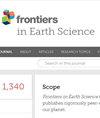Multidimensional evaluation and service strategy analysis of hazard warning and risk reduction
IF 2
3区 地球科学
Q3 GEOSCIENCES, MULTIDISCIPLINARY
引用次数: 0
Abstract
To refine the meteorological warning service for decision makers and enhance their role in disaster risk reduction, this paper puts forward the efficiency index for warning on disaster risk reduction by analyzing meteorological warnings. The influence factors of the index are investigated, and an index calculation model is established by using Grey relation analysis. The weights of the evaluation factors are determined by entropy weight method to quantify the efficiency of warning. Additionally, the reminder strength of different warning delivery methods to decision makers is studied, and a refined delivery strategy tree for warnings to decision makers is established based on the efficiency index and reminder strength of delivery means. The proposed strategy has been applied to the warning service system in Fujian Province. Results show that its implementation has improved the efficiency of warning dissemination and reduced delivery warning costs.危害预警和风险降低的多维评估与服务策略分析
为了完善气象预警对决策者的服务,增强其在减灾中的作用,本文通过对气象预警的分析,提出了减灾预警效率指数。研究了指数的影响因素,并利用灰色关系分析法建立了指数计算模型。采用熵权法确定评价因子的权重,量化预警效率。此外,还研究了不同预警传递方式对决策者的提醒力度,并根据传递方式的效率指数和提醒力度,建立了精细化的决策者预警传递策略树。所提出的策略已应用于福建省的预警服务系统。结果表明,该策略的实施提高了预警发布效率,降低了预警发布成本。
本文章由计算机程序翻译,如有差异,请以英文原文为准。
求助全文
约1分钟内获得全文
求助全文
来源期刊

Frontiers in Earth Science
Earth and Planetary Sciences-General Earth and Planetary Sciences
CiteScore
3.50
自引率
10.30%
发文量
2076
审稿时长
12 weeks
期刊介绍:
Frontiers in Earth Science is an open-access journal that aims to bring together and publish on a single platform the best research dedicated to our planet.
This platform hosts the rapidly growing and continuously expanding domains in Earth Science, involving the lithosphere (including the geosciences spectrum), the hydrosphere (including marine geosciences and hydrology, complementing the existing Frontiers journal on Marine Science) and the atmosphere (including meteorology and climatology). As such, Frontiers in Earth Science focuses on the countless processes operating within and among the major spheres constituting our planet. In turn, the understanding of these processes provides the theoretical background to better use the available resources and to face the major environmental challenges (including earthquakes, tsunamis, eruptions, floods, landslides, climate changes, extreme meteorological events): this is where interdependent processes meet, requiring a holistic view to better live on and with our planet.
The journal welcomes outstanding contributions in any domain of Earth Science.
The open-access model developed by Frontiers offers a fast, efficient, timely and dynamic alternative to traditional publication formats. The journal has 20 specialty sections at the first tier, each acting as an independent journal with a full editorial board. The traditional peer-review process is adapted to guarantee fairness and efficiency using a thorough paperless process, with real-time author-reviewer-editor interactions, collaborative reviewer mandates to maximize quality, and reviewer disclosure after article acceptance. While maintaining a rigorous peer-review, this system allows for a process whereby accepted articles are published online on average 90 days after submission.
General Commentary articles as well as Book Reviews in Frontiers in Earth Science are only accepted upon invitation.
 求助内容:
求助内容: 应助结果提醒方式:
应助结果提醒方式:


